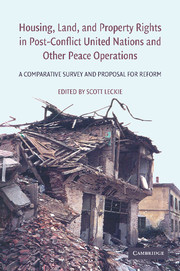 Housing, Land, and Property Rights in Post-Conflict United Nations and Other Peace Operations
Housing, Land, and Property Rights in Post-Conflict United Nations and Other Peace Operations Book contents
- Frontmatter
- Contents
- Contributors
- Acknowledgments
- Foreword by Dan Lewis
- I INTRODUCTION
- II CASE STUDIES
- 2 Stability, Justice, and Rights in the Wake of the Cold War: The Housing, Land, and Property Rights Legacy of the UN Transitional Authority in Cambodia
- 3 The Response of the United Nations Interim Administration Mission in Kosovo to Address Property Rights Challenges
- 4 Balancing Rights and Norms: Property Programming in East Timor, the Solomon Islands, and Bougainville
- 5 Housing, Land, and Property Restitution Rights in Afghanistan
- 6 Peacekeeping and HLP Rights in the Great Lakes Region of Africa: Burundi, Rwanda, and DR Congo
- 7 The Trouble with Iraq: Lessons from the Field on the Development of a Property Restitution System in “Post”-Conflict Circumstances
- 8 Sudan's Comprehensive Peace Agreement: An Opportunity for Coherently Addressing Housing, Land, and Property Issues?
- 9 The Impacts of UN Peace Operations on Local Housing Markets
- III CONCLUSIONS
- Index
2 - Stability, Justice, and Rights in the Wake of the Cold War: The Housing, Land, and Property Rights Legacy of the UN Transitional Authority in Cambodia
Published online by Cambridge University Press: 15 July 2009
- Frontmatter
- Contents
- Contributors
- Acknowledgments
- Foreword by Dan Lewis
- I INTRODUCTION
- II CASE STUDIES
- 2 Stability, Justice, and Rights in the Wake of the Cold War: The Housing, Land, and Property Rights Legacy of the UN Transitional Authority in Cambodia
- 3 The Response of the United Nations Interim Administration Mission in Kosovo to Address Property Rights Challenges
- 4 Balancing Rights and Norms: Property Programming in East Timor, the Solomon Islands, and Bougainville
- 5 Housing, Land, and Property Restitution Rights in Afghanistan
- 6 Peacekeeping and HLP Rights in the Great Lakes Region of Africa: Burundi, Rwanda, and DR Congo
- 7 The Trouble with Iraq: Lessons from the Field on the Development of a Property Restitution System in “Post”-Conflict Circumstances
- 8 Sudan's Comprehensive Peace Agreement: An Opportunity for Coherently Addressing Housing, Land, and Property Issues?
- 9 The Impacts of UN Peace Operations on Local Housing Markets
- III CONCLUSIONS
- Index
Summary
Introduction
Cambodia has made important progress in terms of political stability and economic growth since the devastation wrought by the Khmer Rouge regime in the early 1970s and the many subsequent years of civil war and economic stagnation. This has come about largely due to a “threefold transition,” beginning in the early 1990s, which led Cambodia “from civil war to peace, from one-party rule to multiparty politics, and from an isolated and subsistence-oriented economy to one based on the market and open to international trade.” Nevertheless, the depth of Cambodia's political transition has been questioned. Despite periodic elections, the Cambodian People's Party (CPP), which controlled Cambodia prior to 1991, has yet to peacefully relinquish meaningful power and continues to rely on both intimidation of its opponents and the exercise of its authority through an unaccountable and intrinsically corrupt political patronage system.
Cambodia's current transition began with the 1991 Paris Peace Agreement, which formally ended decades of conflict in Cambodia and paved the way for multiparty elections and a new constitution. Under the terms of the agreement, a large international civil and military peace mission, the UN Transitional Administration in Cambodia (UNTAC), was created in order to oversee Cambodia's transition. UNTAC wielded significant formal and real power during its short tenure (1992–1993) and is often described as the midwife of the largely stable and nominally pluralist constitutional monarchy that exists today in Cambodia.
- Type
- Chapter
- Information
- Housing, Land, and Property Rights in Post-Conflict United Nations and Other Peace OperationsA Comparative Survey and Proposal for Reform, pp. 19 - 60Publisher: Cambridge University PressPrint publication year: 2008
- 2
- Cited by


